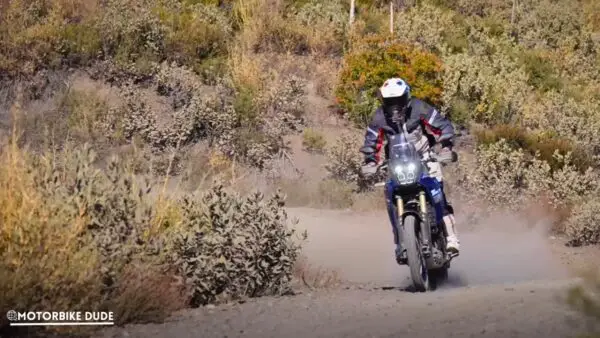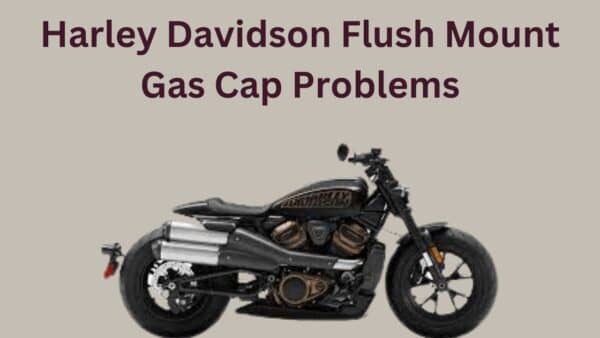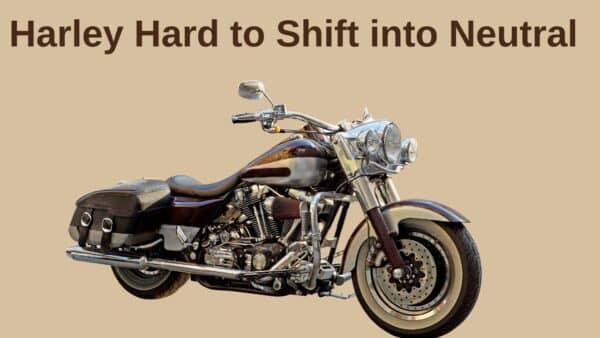The Yamaha Tenere 700 has earned a reputation for its rugged capabilities and the joy it brings to the off-road experience.

However, even the most well-designed machines have their setbacks.
In this guide, I’ll provide you with the most common problems that owners are reporting with Tenere 700 and offer you their solutions.
Let’s begin!
Yamaha Tenere 700 Problems
Yamaha Tenere 700 problems are weak suspension, uncomfortable seat, poor wind protection, fuel tank cap issues, faulty brakes, handlebar vibration, windscreen issues, dashboard display problems, overheating, clutch issues, and carbon build-up.
1. Weak suspension
Some Yamaha Tenere 700 riders have noted the need for a sturdier suspension to tackle the rough and tumble of off-road treks.
When pushed to the limits on rugged terrains, a weak suspension can result in a less-than-optimal ride, affecting both comfort and control.
To resolve this, you should consider aftermarket upgrades that offer adjustable settings tailored to your riding style and the demands of the terrain.
Enhanced suspension components can provide you with a more resilient and adaptable ride, ensuring the bike and rider can confidently navigate through challenges.
2. Uncomfortable seat
Many riders have reported that the seat on their Tenere 700 can cause discomfort during long journeys.
This is an issue that detracts from the overall riding experience, as it can lead to soreness and fatigue.
Fortunately, you can resolve this problem by opting for a seat upgrade.
Aftermarket solutions offer a variety of options tailored to individual preferences, including seats with improved ergonomics, extra cushioning, or gel inserts.
In this simple way, you can significantly enhance ride comfort, which in turn allows for longer and more enjoyable adventures.
3. Poor wind protection
This motorcycle does leave some riders feeling exposed to the elements due to its minimal wind protection.
When cruising at high speeds or tackling long distances, the force of the wind can become fatiguing and uncomfortable.
An effective solution to this issue is the installation of an aftermarket windscreen.
Related: Yamaha Super Tenere Issues
These screens are designed to redirect airflow around the rider, reducing wind pressure and noise, which makes the ride more comfortable.
This simple upgrade can dramatically improve your riding experience on the Tenere 700.
4. Fuel tank cap issues
Some riders have noticed problems with their fuel tank caps. It’s either difficult to open or close, or it doesn’t seal properly.
This can be troubling, especially if you’re far from home. A cap that doesn’t seal can let dirt and moisture sneak into your fuel, which can lead to engine issues.
So, a quick solution is to ensure the cap and its sealing area are both clean and debris-free.
If the problem continues, you can replace the cap or the seal. This way, you can keep your adventures going without unwanted interruptions.
5. Faulty brakes
This can be a worrying problem, especially when you’re relying on your brakes to safely navigate treacherous trails or busy streets.
The solution is to properly check up and maintain your motorcycle.
If the brakes aren’t as sharp as they should be, it might be time to bleed the brake lines to remove any air bubbles which can cause a spongy feel to the brake lever.
On the other hand, you should inspect the brake pads for wear and ensure they have enough material.
If the pads are worn down, you can replace them to fix the braking power of your Tenere 700, getting you back to riding confidently and safely.
6. Handlebar vibration
Handlebar vibration can be a bit of a surprise, especially during long rides which can lead to discomfort or even numb hands.
It’s commonly caused by the natural frequency of the bike vibrating through the handlebars.
To reduce this, consider installing heavier bar-end weights or grips that can absorb these vibrations. Aftermarket solutions like anti-vibration handlebar risers are also available.
For a more thorough fix, check if the handlebar mounts need tightening or if the wheel alignment is off, as these can contribute to the problem.
7. Windscreen issues
These challenges range from suboptimal wind deflection to excessive noise and vibrations, which can detract from the enjoyment and comfort of long rides.
To resolve these problems you have to explore various aftermarket solutions.
Installing a taller or adjustable windscreen can significantly improve the situation, offer better protection against the elements, and reduce wind buffeting.
This simple change not only enhances your comfort but also contributes to a more focused and enjoyable journey.
8. Dashboard display problems
This problem can be flickering screens to complete blackouts, which makes it hard to read essential information while riding.
Such glitches can be not only annoying but also dangerous if they occur while on the move.
One solution is to check the dashboard’s connections for any loose wires or corroded terminals, which can disrupt the display’s function.
Related: Yamaha V Star 1100
Sometimes a simple unplug and reconnect can solve the problem. For persistent issues or displays that don’t recover from a blackout, you should consult an authorized dealer.
9. Overheating
Overheating can be a troubling sign, suggesting that the motorcycle is working too hard and could be at risk of damage if the issue isn’t addressed.
A solution to consider is ensuring the coolant is topped up and replaced according to the manufacturer’s schedule.
You should keep an eye on the radiator for any debris or dirt that could be blocking airflow, as a clean radiator aids in better cooling.
Also, you can install aftermarket radiator guards that can provide extra protection from rocks and debris.
If these steps don’t resolve the problem, you may need to consult with a professional mechanic for a thorough assessment.
10. Clutch issues
This issue often presents as a clutch that’s hard to pull, inconsistent engagement, or a slipping clutch that affects the bike’s performance.
The usual suspects behind such troubles include worn-out clutch plates or a stretched clutch cable.
To resolve these issues, you may need to get your hands dirty and replace the clutch plates or adjust the cable.
A well-maintained clutch promises a smoother ride and ensures the longevity of your motorcycle’s transmission system.
11. Carbon build-up
This problem occurs when fuel doesn’t burn completely, leaving behind a black residue that can affect your bike’s performance.
So, the solution is to keep up with your motorcycle’s service schedule and ensure that spark plugs and air filters are changed as recommended.
These parts play a crucial role in maintaining a clean and efficient burn of fuel.
You can also opt for high-quality fuel for your Tenere 700. Inferior fuel can contribute to carbon accumulation, so it’s best to avoid it if possible.
Lastly, consider using a fuel additive designed to clean the engine. These additives help in removing carbon deposits as you ride.
Yamaha Tenere 700 Technical Specifications
| Specification | Detail |
| Make Model | Yamaha Ténéré 700 |
| Year | 43mm Upside-down telescopic fork, fully adjustable |
| Engine | Liquid-cooled |
| Capacity | 689 cc / 42.04 cu-in |
| Bore x Stroke | 80 x 68.6 mm |
| Cooling System | Wet multi-plate |
| Compression Ratio | 11.5:1 |
| Lubrication | Wet sump |
| Induction | Fuel Injection |
| Emission | Euro 5 |
| Ignition | TCI – Transistor Controlled Ignition |
| Max Power | 73.4 hp / 54 kW @ 9000 rpm |
| Max Torque | 68 Nm / 50 lb-ft @ 6500 rpm |
| Transmission | Constant Mesh, 6 Speed |
| Final Drive | Chain |
| Clutch | 43mm Upside-down telescopic fork, fully adjustable |
| Front Suspension | 43mm Upside down telescopic fork, fully adjustable |
| Front Wheel Travel | 210 mm / 8.3 in |
| Rear Suspension | Single shock, adjustable preload (with remote adjuster) and rebound damping |
| Rear Wheel Travel | 200 mm / 7.9 in |
| Front Brakes | 2x 282mm Hydraulic discs |
| Rear Brakes | Single 245mm Hydraulic disc |
| Front Tyre | 90/90 R21 M/C 54V M+S – Spoke wheels with Pirelli Scorpion Rally STR |
| Rear Tyre | 150/70 R18 M/C 70V M+S – Spoke wheels with Pirelli Scorpion Rally STR |
| Dimensions | Length 2370 mm / 93.3 in, Width 914mm / 35.6 in, Height 1455 mm / 57.3 in |
| Wheelbase | 1595 mm / 62.8 in |
| Seat Height | 874 mm / 34.4 in |
| Ground Clearance | 239 mm / 9.4 in |
| Wet Weight | 205 kg / 452 lbs |
| Fuel Capacity | 16 Litres / 4.2 US gal |

Ahtsham Younas is a passionate blogger and content writer. He loves to ride motorcycles and learn the mechanical process behind the motorcycles.
He has been writing articles in the motorcycle industry since 2019 and has learned many things about motorbike niches.


